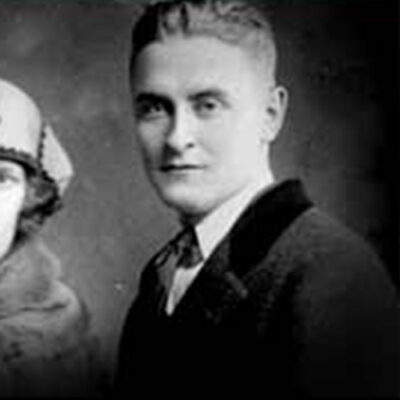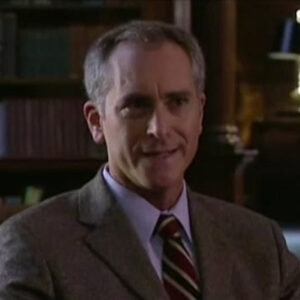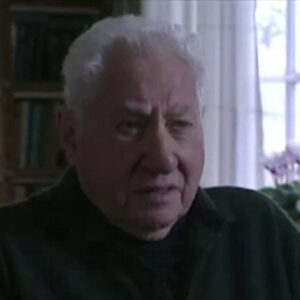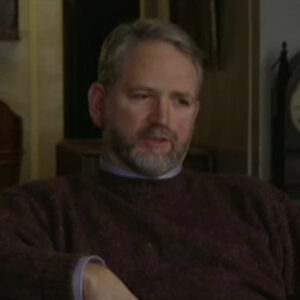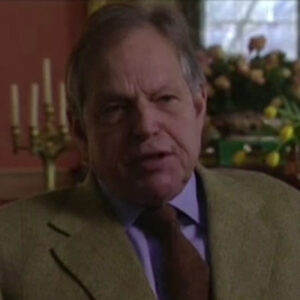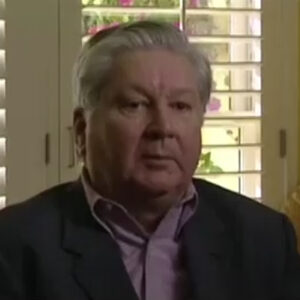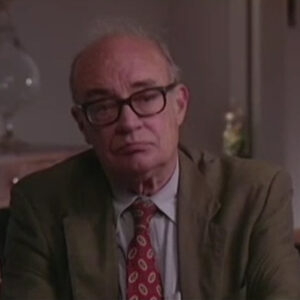Speaker What happened?
Speaker Can you talk a little about the relationship of your mother and Scott starting? I mean, I’m I know that they are discussing a little of what they had both read and discussed.
Speaker Well, he maybe he first met my mother when he went into that pay that afternoon when I first saw him, that she was still there frantically cleaning up the house.
Speaker And she was must have been wearing one of her. She must have been someone like he had never seen before in his life because his idea of a woman was a kind of a quicksilver, glamorous of a paper thin person like Zelda, you know, beautiful, shimmering young woman.
Speaker And there was my mother with her hair about hand wearing a big bun and her face totally free of makeup and dressed, I’m sure one of her kind of crummy summers seersucker dresses.
Speaker And he probably thought, you know what, I never we have nothing in common can ever be bothered with her.
Speaker But as it turned out, they somehow got together and and he suddenly realized that he was a goldmine of information and comfort and and mutual interest.
Speaker She was an enormous reader. She had not heard of him hardly at all, which shocked.
Speaker I mean, he couldn’t get over that period that Scott Fitzgerald said. But he was very impressed by the fact that she was reading Proust.
Speaker And so we talked a lot about books and they talked about us children.
Speaker And and I think I’ve already said that she was she was a sounding board for all of his problems.
Speaker He told her all about Zelda and his book he just couldn’t finish and his financial problems and and he needed her. He needed her. And he come up sort of impromptu in the afternoons. And occasionally mother would invite him for dinner, even though my father was there on special occasions like when T.S. Eliot came.
Speaker And of course, I wasn’t that kind of a table. But she told me later that Scott arrived completely sober. I mean, I don’t know how I managed it because it was in the evening and he started to drink at ten in the day deep and it was whiskey at ten o’clock in the morning. And after dinner, she said he behaved beautifully. And after dinner, he asked T.S. Eliot to read some of his poems, which she did, and then T.S. Eliot and Return asked Scott to read some passages from his current tenure as a knight, which he did.
Speaker And Mother said it was just a lovely, illuminating, most successful evening.
Speaker And of course, she was so afraid that he was going to make a, you know, bug a bundle of a mess of it by by arriving drunk and just ruined the whole thing.
Speaker So she was taking a great risk. But he was so and all of Elliott that he was able not to drink only day in his life, probably while he was at my pay.
Speaker What was his routine? What was his as you observed it or as you learned it? But was this kind of routine? He is a right.
Speaker Oh, he was a Knight Rider.
Speaker He slept until around ten and he came down and shuffled down in his car. I told you his pajamas and dressing gown. He very rarely dressed except when he went outside to play with Andrew. And then he was always in these shabby white flannels, saddle shoes and pink shirts. That was his wardrobe.
Speaker And it was a question, what was his routine in the day?
Speaker Oh, yeah. And you see, he got up around 10:00 and do a study and he had Misiones there and and he he was sort of in and out all day.
Speaker And then he stay up way into the night working and as I said, sleep late in the morning. And how were you aware of this?
Speaker Of course.
Speaker I mean, I was there so often. I was there during the day, too.
Speaker I knew just just what his routine was. He was living a very solitary life and he was desperate to finish the end of this novel.
Speaker This novel Being Tender is the night which he spent, I think, almost nine years on. I had rewritten at least four times.
Speaker Fitzgerald is my favorite novel, by the way, of all of his I don’t even like a lot of his work, but well, I like The Great Gatsby.
Speaker Everyone likes The Great Gatsby. But and it wasn’t because it was written on our place.
Speaker It was just it was just my favorite novel as an adult.
Speaker Do you like it?
Speaker I do like tender, but oddly enough, for some reason I have trouble getting really into the novel inside it emotionally, whereas with some of his other work I do a lot of it.
Speaker Was Orvie autobiographical? You know, Zelda was supposed to be Nicole and he and he was supposed to be I can’t think of the man’s name, but the doctor who picked over Dick Diver, fascinating dick diver who went downhill just as this girl went downhill the end of his life he was hardly ever heard of. He was in some little town in upstate New York.
Speaker What was Fitzgerald? Here’s the thing I want to ask, which is more about you as a reader than than knowing him. It’s usually dangerous to assume that a writer invests himself in his in his his own life or sees it through his fiction, through the prism of his own life. Scott seems to be a huge exception to that. He seemed to need almost to emotionally experience something before he could write about it. Could you? Is that do you think that’s true?
Speaker Do you think that his faith that, again, he used that the average author is what?
Speaker Well, it’s usually dangerous. Did did Scott use his own life and life experience?
Speaker Oh, yes. Yes.
Speaker He I think, as I told you, he he worked strictly from emotion. I know. And looking back on it, I don’t think Great Gatsby was from emotion. That was the exception.
Speaker But his two early books about this about this sort of paradise, of course, was all about his life in Princeton.
Speaker And he really only wrote on the Crack-Up was completely I mean, he was a breakthrough for revealing your inner feelings. People were very surprised that he would let his hair down that way and show how how lonely and desperate he was.
Speaker Different Crack-Up. Yeah, that was a very sad book. Could you say that last phrase again? What, in the Crack-Up. Very sad book. The Crack-Up was a very sad book.
Speaker What was his relationship like with your father, jealous of Scott or.
Speaker Yes, a little bit. He didn’t realize it, that my mother was so under his spell she was probably in love with him, but didn’t, you know, wouldn’t admit it. Everybody was. And Scott had a I shouldn’t call him Scott.
Speaker I should call him Mr. Fitz, for goodness sake of women who were very drawn to him. I mean, he the way he just look at you and listen to you and draw you out and make you feel so important. And this he had this wonderful aura about him.
Speaker Oh, I personally think that he enjoyed the chase other woman more than the actual completion.
Speaker He had a lot of the feminine of, you know.
Speaker And that’s probably why he wrote Strictly from Emotion, because there was so much of a female in him and he was totally different from Hemingway, he was strictly macho and didn’t have any of the women in him at all.
Speaker This, Scott, have the need to he seemed to want to be more masculine.
Speaker By that I mean in all he wanted.
Speaker Well, that’s why he got the boxing lessons with Andrew and he yeah, he worked. He wanted to be, but they couldn’t be. I mean, he just.
Speaker He wanted to be what is a new for you want to be stronger naturally.
Speaker He was so weak then he wanted to be back, back as he was of 15 years before when he was adored and was a darling of the Riviera in spite of his outrageous behavior. But I mean, I think he would like to have had more of the men in him.
Speaker I was only nine, what do I know?
Speaker Were you said to me at one point that there was kind of a macho, there was sort of he lunge for the macho thing, even what he did with Andrew, whether, you know, whether they were boxing and knocking each other out, and Scott seemed to enjoy it.
Speaker Maybe he was doing it partly for himself, but he he ostensibly was doing it for my brother to develop his little puny arms. You see the maybe I think I think Scott enjoyed it himself. They spent hours out there doing that.
Speaker But Scott Fitzgerald, I’ve got to I don’t know. We’ve never asked I’ve never discussed this before. But with you, he he aspired to the glittering, but he also was aspiring to the gentry, to the old money world. And yet he saw through the old money world simultaneously. Could you express that as a no?
Speaker I mean, he was very ambivalent. Of course, he was very ambivalent, but he was drawn to the old money world.
Speaker He wanted so much to be known as a gentleman, as someone who’d been in this country for centuries, you know, the old guard.
Speaker And and yet, as you say, he found many of them very boring because they were and most of his the people that he spoke about to mother who were not were not that we’re not that kind of person at all.
Speaker But he still wanted to be that. Why? Why? Because he as I said, he felt they had power and authority and glamour and and and he was so ashamed of his mother told you that before she was half of him, after all.
Speaker And his father was a very weak, very diluted aristocrat. If he was at all, it was so diluted that you couldn’t hardly existed.
Speaker And I think he died rather early on. I can’t remember.
Speaker Did Scott what did he want most in life and need most in life?
Speaker Scott was asking me these questions. How could a child of nine know what?
Speaker Because you told me this before. What you sensed about him was that he desperately wanted to be accepted.
Speaker What he said is, well, can we do anything? Yes. He wanted. Oh, that was the most important thing in his life.
Speaker His acceptance, the center of a stage to be looked up to to be praised because he’d had all of that you see in his early much, much too soon, actually, when he was in his bare 20s and it all stripped away by the time he was 35.
Speaker And and he missed that. So he missed it.
Speaker So and he lost his confidence and he had lost his stamina and he lost his cockiness and he lost his self-assurance.
Speaker He was tentative.
Speaker What is secretly he was tentative and unsure of himself is that he with Scottie, he was an incredibly strict father by letter and maybe in person, and yet he wasn’t incredibly strict when she was nine.
Speaker He was later on, according to he wrote all those letters at college.
Speaker And he he underneath it all, he was a real puritan, you know, in spite of all of his wild talk. He was a real pure puritan anyway, and was going to get involved with boys to do so in a word about what their influence would be on her and how she’d become too jaded and too blasé.
Speaker He wanted to keep her and childhood as long as he could, but he was a real puritan. And yet he led when he was outrageous, like, can we do that again? He was a real puritan. And yet he led and his youth and outrageous life. But I don’t think he had many affairs or maybe even any.
Speaker There was one woman in Hollywood named Moran.
Speaker What was her first name? She was a little movie star and he was very taken by her. And Zelda accused him of constantly of having an affair with him. And my brother didn’t think he had one at all.
Speaker It was just sort of talk and the chase.
Speaker But the affair never took place. Of course, he had children in his life, the end of his life.
Speaker But even though he loved women and women loved him, he couldn’t come through at the final moment. I think he was I think he was sexually insecure.
Speaker What fueled his outrageousness? Let’s say we never heard of Scott Fitzgerald Young because of his tremendous. I’m sorry, can we start again? Gave my voice.
Speaker Well, he was he was successful. My God. At 20 years old, his book was The Book of the Year, The Side of Paradise. Everyone was reading it and it just went it was too young for this kind of success. He couldn’t handle it.
Speaker I mean, you can have it at that age. And he also was so good looking and so, so elegant and so flamboyant.
Speaker And and I I think the public was interested not only in his writing, but but in the way he lived his life.
Speaker And his whole romance with Zelda was so dramatic. And and she was she just was a perfect twenty’s, you know, flapper.
Speaker And it all went through his head.
Speaker He was very he was too immature for all that success.
Speaker He wrote in his notebook that 1928, I think he said, The nation and Zelda go bust.
Speaker That’s when she became a her rocker. And that’s and I think it was that year of a next year when she got got this this eczema my brother described is sort of an iron mask of of of eczema. She was within her whole face was hell with an iron mask of eczema. Can you imagine anything more repulsive? And that came from her breakdown. I’ve never heard of that before. And that’s what pitted her skin. So terrible, you see later on when it cleared up.
Speaker Oh, is it a I mean, he would not let go of her, he kept hoping that she would come back and live with him and Scottie permanently. And I think he finally gave it up when he left Baltimore. In nineteen thirty six, I think it was, he went out to Hollywood, where he was not appreciated, people didn’t even know who he was, I’d forgotten all about and did.
Speaker This is an odd question, but a lot of people don’t understand this about him and a lot of writers, but especially him.
Speaker You have to work hard at work to write. Can we start fresh freshly if they had to work?
Speaker He was a very hard worker, very slow. This was later on his life because he became a very slow, hard worker.
Speaker Every word was ground out of him.
Speaker Now, in his youth, he just wrote This Side of paradise. It was six months and he wrote or maybe it was a year. And he wrote Great Gatsby in six months.
Speaker He was at his prime then.
Speaker And after Great Gatsby, he didn’t write a thing until 10 years of like.
Speaker This town, I think, was spent early on, but he believed that it was a fire that went out much too soon, was just flickering still, but the real fire had gone out.
Speaker He believed that talent, including his own talent, was a finite supply, that you had to mine it and that depleted that he believed his talent was finite, was limited, in other words, that we all have.
Speaker Yes, yes. Yes, he knew. He knew after The Great Gatsby, which was a great success.
Speaker Again, I mean, as in every every schoolboy schoolgirl has to read The Great Gatsby. And that’s after that.
Speaker I think he he ran out of steam up until then, writing. It was easy for him. He used himself up to too fast and too soon.
Speaker The Crack-Up be spent with just a series of essays, you know, that he would write really more for himself, he wrote in his ledger, by the way, every day a huge ledger that people know all about his life and the scholars know all about his process.
Speaker Whose ledger?
Speaker But the real he knew that his that his the fire had gone out of his belly and, you know, when I hear about the way he lived at la Paix, I assume that he had you know, he had a chauffeur.
Speaker He had this big house. He had several chauffeurs.
Speaker He ran through them and just packs of cards, you know, he just ran through them.
Speaker They wouldn’t stay with him because he was so difficult to work for. He got drunk and behaved and behaved outrageously to them. And only Misiones stayed with him. And incidentally, the food that they served, you wouldn’t serve to a dog had no appetite for food. I used to eat dinner there occasionally. I didn’t. I mean, we had a wonderful table. I couldn’t eat their food.
Speaker What else got had to eat it. She didn’t know any better.
Speaker And when she was married at the age of twenty twenty, I think she had a reception at the Waldorf in New York City and she served bad champagne and little peanut butter and jelly sandwiches.
Speaker That was it.
Speaker My mother was there. I was there. Oh is it. Oh well this is yes. ADEC. Why didn’t she get a caterer.
Speaker But that’s the way Scotty was. You know, she’d been brought up on on dog food most of her life. And so she does continue to serve.
Speaker Well, the reason he ran through so many chauffeurs, I think was also for your only three or four. It’s a fresh start. Misiones was there.
Speaker Is that I thought you told me he always was an iron woman. She was wonderful.
Speaker White. I’m sorry again. Just write again.
Speaker Just that Misiones, as he always was, an iron woman. She was wonderful for him. She kept him going. You know, she without her, I don’t think I don’t think he could have finished her as a knight.
Speaker And how did she.
Speaker She was she was she was a no nonsense style redheaded woman who I don’t even think respected Fitz-Gerald because it was drinking. But she really but she had a mission. She was a woman who liked missions. And he she was going to see him through. She was loyal to it.
Speaker And how did she you told me at one point that Misiones, using her name, if we can, was the show first kept taking him over to the house and to get drunk in the middle of the day and she’d fire them?
Speaker Yes. Yes, she did. And Aquilla was a there was a black chauffeur we all loved and we don’t know what is.
Speaker Joan hired him because it was in the depths of depression. And you could there was a glut on the market, you know, for a job, for any kind of a job. And he was this is a guy that knows it must have been broken in a fight or something because it was all from here to here on his face and he had a speech defect.
Speaker He couldn’t pronounce certain letters.
Speaker But I think this general was entertained by his cockiness and his self-assurance.
Speaker In spite of all of his defects. Aquilla had confidence. He he just thought he was fine and selfish.
Speaker Gerald hired him and we’d go to the movies sometimes with a girl and Fitzgerald always in the front seat together and we’d run around in the back seat.
Speaker Was it a Shults?
Speaker He had an old, great old stat’s bearcat. Oh, that’s Bearcat.
Speaker I think that’s got a sketch.
Speaker Stutts that starts a stutts huge and very second hand.
Speaker And Mr Fitzgerald would make up all these impossibles and says Aquilla to repeat, you know, trying to improve his speech there he was again trying to improve Aquilla Aquilla was another project.
Speaker And in particular I would repeat and repeat and repeat, but Aquilla had to go because he just couldn’t resist Fitzgerald’s charm mischiefs under his belt like everyone else. And Fitzgerald just inveigled him to take him to the bars on the disastrous results. So for Aquilla and we missed him so much because he he gave a. Makes sense to that atmosphere down there. It was very tense, you could tell how tense it was.
Speaker You needed some comic relief tense between. Aquilla also demanded that a member of his jail saying, what do you want to wear? And Equilar said, I want a purple pinstriped uniform. And this Joe gave him one of the marvels and that amused this Joe. So, you know, he demanded a purple, bright, purple pinstripe, broad shouldered uniform.
Speaker With all of this that you’re describing, it would be easy for someone who hadn’t didn’t know a lot about Fitzgerald’s life to think the guy had plenty of money when he had practically none.
Speaker He was practically not. I told you he was just working those. I’m sorry. Think and we start again. He had practically no money. No, he had practically none at that point.
Speaker The can we start again using Fitzgerald’s name?
Speaker Fitzgerald had practically no money at that point.
Speaker He was able to keep his family afloat by those stories in the Saturday Evening Post that he would grind out.
Speaker He knew a lot of them are rotten, but I think they still paid the most of any magazine at that time. That’s what he was living on. And in between that, of course, he was struggling with tender was a night.
Speaker What was the pay was a name of my grand parents country house.
Speaker And as I told you, they were very Victorian. And of course, the pay means the peace, very religious, very Victorian, a very prudish.
Speaker And my father, who was an architect when he got married, built his house on top of the hill. We had about they had about 35 acres.
Speaker And it was it was a beautiful place with Marvis old trees.
Speaker In fact, we found lots of Indian arrowheads. The Indians had been there and we had a big pond with a wild drakes.
Speaker And we had this beautiful long flower bed, this garden path. And we had a wonderful rose garden.
Speaker And it was it was just a lovely little private haven.
Speaker And there’s a fresh thought. Who decided it had ever been rented using its name? Oh, it was rented, yes.
Speaker Because of the pain of the time. I remember it was a very dreary, forlorn, a kind of faded purple color with all kinds of bulges, you know, bulgy windows and mysterious peaks.
Speaker I dreaded it. I was afraid to go into it. And Mother had and father had rented it to a nursery schools and to, well, mostly nursery schools that cater to an institution. Mr Fitzgerald was the first family that had ever lived there. And of course, after the fire took took place, they never remarried again. We just it was just burnt down.
Speaker What made your father dislike Scott?
Speaker Using names, using their names. Sorry. Sorry.
Speaker Yeah, OK.
Speaker Drinking. He was so adamant against alcohol.
Speaker Wait, you got to use my father again. My father was sorry. My voice is in here.
Speaker OK, ask the question again.
Speaker What made your father using his name.
Speaker His my father is so upset and dislike Scott his terrible drinking.
Speaker My father was a total absolute teetotaller and anyone who drunk was to him a villain no matter what. And he thought that if Scott would have a terrible influence on Andrew and me.
Speaker You didn’t want us down there.
Speaker Mr. Fitzgerald knew that my father didn’t like him, but mother said that he only mentioned my father once to her and he he said once he said, Margaret, Mr Turnbull is a very complicated man.
Speaker That’s all he ever said about it. Didn’t talk against it.
Speaker Well, I went to Catholic school, which stopped at the 12th age, which meant 12 years old, and it was coeducational boys and girls, and I was a big problem and they knew how to handle me.
Speaker I loved that school.
Speaker What was the assembly using, they had an assembly every Wednesday, but not a play where kids who had just encountered school have come in school, had an assembly every Wednesday, not a play, but some form of entertainment or a speaker. And then occasionally they would have a play and maybe a year or 10 year.
Speaker And you were the star. I was his best, best, best of them all. And Alice.
Speaker And Looking-Glass.
Speaker Which they had, which I think they do every year, one time, because it’s one of their favorites and it has a large cast, but when I was there, I told you I gave a perfect command performance for their their final play because I had been so good in the role of Alice. I’m just a year and a half before I was just a little plump, a voiceless oyster. I mean, I had made a big leap, right.
Speaker Until you showed up, F. Scott Fitzgerald.
Speaker And what happened? I have we’ve done this we’ve done this before, I froze, I saw him come in and that gray plaid suit and sit way down in front of the auditorium was packed because the word had gotten around that he was going to be there. And many of the parents knew who he was.
Speaker And I peeked around the curtain before the curtain went up and I saw and and I just I just froze and I went out on the stage and I just wasn’t Aulus anymore.
Speaker I just wasn’t this little girl and little Victorian prim child and her blue uniform and her high white pinafore and talking with these crazy nonsensical animals and holding my own very well.
Speaker I, I was just a. I was just bad.
Speaker Did you sense that he knew he being Mr. Fitzgerald uses his name, please, no, you were bad. I was bad.
Speaker I was poor. I wasn’t I wasn’t Alice. I was Ellinor. Terrible.
Speaker Mr. Fitz, I think, was right about something, which is that your gift was as an actress, I didn’t have the guts for the strain of being an actress.
Speaker I was just too insecure. I was too nervous. And I was a very poor reader. When they’d hand you a script, you had three minutes to look at. I just couldn’t do it. You know, there are some people that are wonderful first readers, but I wasn’t blessed with that. I had to know the part and I could memorize then like I could memorize, like, crazy. Then when I was in my 40s, I joined Lee Strasberg as class. Have you ever heard of him? And I was there. You have to have a you know, what’s a word? Help me. Well, you have to get up and demonstrate yourself before he’ll let you in, naturally. And it was loaded with people who are already names, you know, who were acting. They just went to him to be do for some more encouragement and learning. And I was there for like two months and no one was laughing at me. And then he had I had the bad luck to have him go out to Hollywood. I thought, again, I go into acting in my 40s, I think I got another little spurt of confidence.

